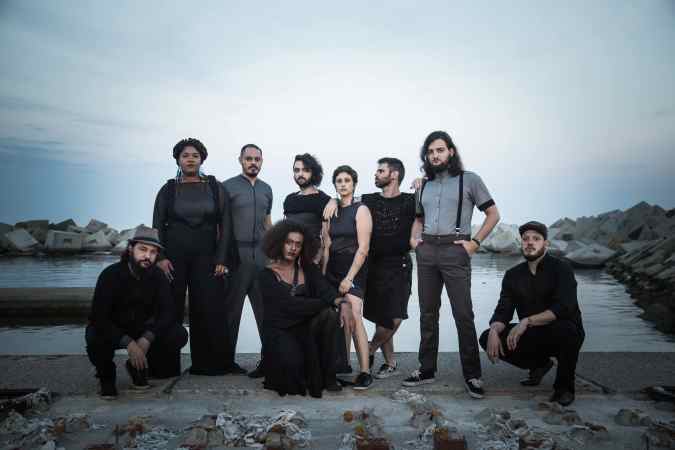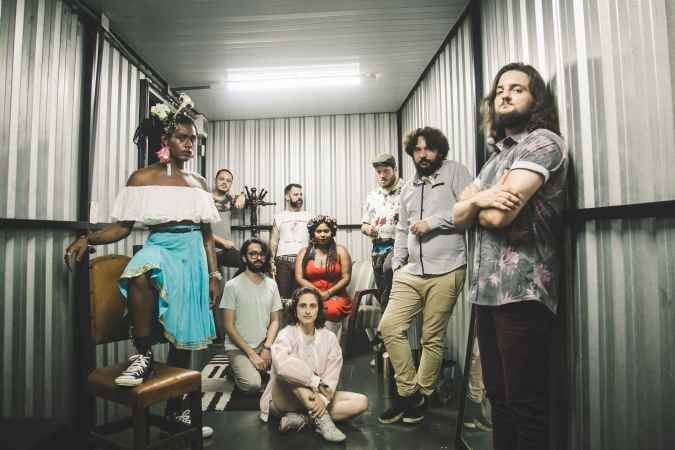“Deixa eu bagunçar você” (“Let me mess you up”) was a key refrain in Brazilian band Liniker e os Caramelows’ viral hit “Zero,” and indeed, in the best of ways, they do. With richly hued music swirling around impeccably dressed Liniker Barros, the band is a soulful beacon of light. As a trans black woman fronting the band, Liniker imbues the lyrics she composed with such soulful and irresistible sultriness that the video has now reached more than 10 million views.
Now considered at the forefront of Musica Preta Brasilera (Black Brazilian Music) as well as a burgeoning black trans music movement in Brazil, Barros and all of the Caramelows – Rafael Barone (bass), William Zaharanszki (electric guitar), Péricles Zuanon (drums), Márcio Bortoloti (trumpet), Renata Éssis (backing vocal) and Fernando TRZ (keyboards), Marja Nehme (percussion) and Eder Araújo (sax) – hail from Araraquara, a city in the southern state of São Paulo, about two hours away from the capital.
Liniker grew up seeing her mom and aunt use dance as a form of resistance, organizing and attending black social dances in what is known as conservative, very white city. As a musician and poet, she mentions divas such as Etta James, Nina Simone, Aretha Franklin and Whitney Houston as her influences, and finds parallels between her poetry and Beyoncé and Solange’s work.
Os Caramelows surround her with a richly textured sound that draws on a multitude of influences. The band members, whose ages range from 21-29, mention Brazilian regional music, electronic music, ethnic music, MPB, pop (both Brazilian and American) samba rock, tropicalia, Brazilian punk and Black Sabbath amongst these influences. They even invented a word to describe their own genre or sound: funzy, for a nearly indescribable fusion that combines all these grooves and the way they represent Brazil in all its hues and textures.

The band’s 2016 first album Remonta garnered third place on the Rolling Stone Brasil list of best albums for that year, and their U.S. debut at this year’s SXSW was one of the festival’s highlights.
We met up with the entire collective in Austin and had a whirlwind conversation in Portuñol – a mixture of Portuguese and Spanish – about life, changes, identity, and the power of music to create new realities. Here are some of the highlights.
Let’s start with the name, how did “caramels” become your name?
We brainstormed about it! We decided on “caramels” – they’re sweet and creamy and everybody loves eating them, it’s so pleasurable. And their stickiness is very enjoyable. And sensual!
With Liniker being a trans woman and such a strong presence, do you find that [that media narrative] sometimes eclipses the rest of the band?
That was something that happened at the beginning in Brazil. But that was a very important stage, because it was important to be open about this and to discuss this at the very beginning. When we started to get bigger and the music started to have a greater reach, then people didn’t want to talk about anything else, it was always all about Liniker and the whole transgender thing.
Liniker: We are a complete band! We are creating culture, we’re making music, not everything has to be about that. I want to talk about other things, I compose music, and besides that I have a whole collective that surrounds me and accompanies me.

Describe your Nueva Musica Preta Brasileira (New Black Brazilian Music).
It has a ton of influences but we like to call it “funzy.” It’s an original word, invented, [to describe] a groovy, funky fusion with lots of swing, ballads, love songs but all with this cadence – very danceable.
In all of Latin America there’s so much black influence; Brazil is no different. We grew up always hearing samba. Liniker grew up in a family steeped in samba. Jazz, funk, all of it, even rock comes from black music. It all has to do with making blackness very present. In Brazil, like fifty percent of the population is black but it’s often shut down. We wanted to give it its place and make sure that our origins and heritage are present and front and center.
The world is getting more violent day by day. So if we scream, we should scream together.
As a band, what’s your musical vision?
We represent the interior of Brazil – most of the music that is consumed in Brazil generally comes from São Paulo or Rio de Janeiro. So for us it’s very important to take this culture from the interior of the country, not just to the rest of Brazil but to other countries also.
In the major cities like the capital or São Paulo, they don’t see us as a city that can export culture. It’s not that our culture is entirely different, but we exist and this is what is important – for people to see that in a city like Araraquara we have people that create art and music and theater other forms of art. It doesn’t all happen just in São Paulo.
One of the biggest differences between the interior and the rest of the country is not as much specifically in terms of music – we have to speak of our case and use the plural because there are many “interiors” – it’s about the way that we create art, it’s almost with a greater intimacy, like in a family, and we create with love and concern for others.
And we also want to make sure that other persons from the interior [of the country], when they see our example, feel like they can create also and can be represented artistically. This is so important.
Liniker has become an icon for a burgeoning black trans musical movement in Brazil. Are things changing thanks to your music?
Brazil has the highest murder rate of bisexuals, trans people, lesbians, homosexual people – every single day, every week you see that another person has been killed.
It’s so frustrating and so we feel glad that we’re able to talk about this as musicians, as artists, as a band. To the public, to the media. We need to speak about this and it’s not easy. On the streets, there’s so much violence directed at all these individuals and today’s political forces are more direct, more hateful, violating human rights and people’s safety.
It’s a way of representing black trans culture, a way to open up the conversation and that way we can speak about Brazil and other trans women and other bands and other gays and lesbians and black women whose existence is questioned.
The world is getting more violent day by day. So if we scream, we should scream together.
We’re hoping that 20 years from now, people look back at Liniker e os Caramelows as a catalyst for change.
And what are your hopes for the future?
The most important thing is that we work towards less walls, less doors for all of us. There are possibilities of being, of ways of living – so many possibilities for humans [whether] trans, bi, hetero. Way beyond all those classifications that we make and that create violence.
We need a future where we are all strong, and differences make us strong. We need to understand and to respect differences between all of us. What’s normal is to be different!
When we see a member of the trans culture singing, it should be a natural thing for everyone. The visibility of this project and other projects with trans people work towards political change, for people to have equal rights and opportunities – that’s the value of art. Religion should not interfere in the dignity of people, with politicians grabbing a bible to create laws. We need a more humanistic vision.
The future should be music, cultural manifestations, freedom. We speak a language – music – where those barriers do not exist. Instead of arguing about gender, we should talk about making music. At this moment we do need to talk about it because of the violence, but in the future, we won’t need to talk about it. It’ll be a thing of the past.
We’re hoping that 20 years from now, people look back at Liniker e os Caramelows as a reference for something that was a catalyst for change. Music has its role, culture has its role, that’s why we’re here, tor that future.
Liniker e os Caramelows will open for iconic samba diva Elza Soares at Central Park Summerstage on August 5.




